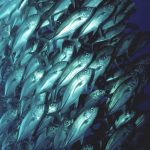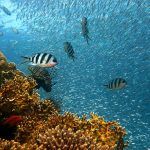 September 27, 2021 1:55 pm
Published by Climate Extremes
September 27, 2021 1:55 pm
Published by Climate Extremes
In this paper, as part of the Future Seas project, the researchers built upon previous work by using a foresighting scenario analysis technique to envision two alternative possible futures for society by 2030, in the context of the challenge of climate change adaptation and mitigation.
 September 8, 2021 4:09 pm
Published by Climate Extremes
September 8, 2021 4:09 pm
Published by Climate Extremes
Using model simulations of the movement of tuna distributions across the tropical Pacific subject to projected ocean changes, the researchers found that without strong mitigation efforts, tuna distributions are likely to shift away from island fishing zones.
 March 15, 2021 10:10 am
Published by Climate Extremes
March 15, 2021 10:10 am
Published by Climate Extremes
This study uses a high‐resolution climate model to investigate how and why marine heatwaves would change for the Australian region. The relative impacts of increases on background ocean temperature and changes to intrinsic temperature variations are compared.
 November 17, 2020 11:31 am
Published by Climate Extremes
November 17, 2020 11:31 am
Published by Climate Extremes
In a new study published in Nature Scientific Reports, a group of oceanographers, atmospheric scientists, ecologists and fisheries experts got together to identify the most severe marine heatwaves over recent decades. The objective was to understand what triggered these events and led to their ultimate demise.
 March 18, 2019 11:53 am
Published by Climate Extremes
March 18, 2019 11:53 am
Published by Climate Extremes
Amelie Meyer is taking part in the Future Seas project, joining a workshop that will result in a series of papers for Reviews in Fish Biology and Fisheries journal.
 April 30, 2018 1:59 am
Published by Climate Extremes
April 30, 2018 1:59 am
Published by Climate Extremes
Centre of Excellence researchers have identified 12 marine heatwave types off the east coast of Tasmania, a location recognised as a global warming hotspot. Here the average sea surface temperatures here have been rising at four times the global average and trends in marine heatwaves are showing significant increases in number.






